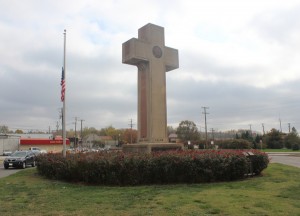Preserving Whose History?
 The 40-feet high "Peace Cross" in Bladensburg, MD.
The 40-feet high "Peace Cross" in Bladensburg, MD. With the Fourth Circuit US Court of Appeals’ decision to uphold the separation of church and state (by determining that the Bladensburg cross was a breach in the wall of separation), came a flurry of hate mail, hate calls, and death threats to the American Humanist Association, which brought the case on behalf of three residents in the Maryland County where the cross stands on public land. Many of the messages we’ve received center around our destruction of American history, our hatred of veterans, our being closet communists, and our inability to understand that a forty-foot cross represents everyone—because really, how many soldiers in WW1 weren’t Christians?
Let’s start with the racial and religious breakdown of our armed forces during WW1. Of the sixteen million men and women who served, over one million were African Americans, thirty-three thousand were Japanese-Americans, twenty thousand were Chinese Americans, twenty-five thousand were American Indians, sixteen thousand were Filipino-Americans, sixty-five thousand were Puerto Ricans, and five hundred thousand were Mexican-Americans. Unfortunately, there are no clear records of the religious breakdown of our troops in the early twentieth century, but it’s not hard to imagine that our Asian-American and Native-American troops had religious beliefs other than Christianity. As for the African-American troops, in 1917 the cross was a symbol of racial oppression. The bloodiest race riots in our nation’s history happened just after the Bladensburg cross was erected, and a few years later the Klan marched across Washington, DC, thousands deep, burning crosses and declaring Christian values. I’m not sure a cross-shaped memorial erected by white Americans during that time period filled African-American soldiers with pride and inclusivity.
Many of us have heard of white privilege, but what about Christian privilege? Christian privilege describes both conscious and unconscious presumptions that Christianity is the social norm, which marginalizes any non-Christian members of society. For example, opinions that suggest non-Christian peoples are inferior or dangerous, or that they are amoral, immoral, sinful, or misguided are symptoms of Christian privilege. These prejudices pervade America’s established social institutions and have evolved as part of our history. The history that so many of the Christian faith are now fighting to protect.
White privilege and Christian privilege are not disconnected in American history. They both hold historical positions of power over non-white peoples and anyone who openly believes anything other than the nationally preferred religion.
The Establishment Clause of the First Amendment was written to protect the United States from having a dominant religion. And yet, because the US is led primarily by white Christian men, there are countless breaches in the wall between church and state, and frankly, threats to every American’s right to live without religious oppression. Roy Moore, the Republican senatorial nominee from Alabama recently argued that the Founders never meant to protect non-Christians, but he also blatantly discriminates against LBGTQ Americans, people of color, and really, anyone who believes differently than him. He is the embodiment of white and Christian privilege entanglement.
The AHA isn’t trying to destroy American history. We are holding our nation to the constitutional rights given to us by the Founders. We are asking Americans, when building a memorial on public land, to memorialize all fallen soldiers by creating non-religious, inclusive monuments. And, as we continue to stand on the front lines of this fight, we are shining a light into the shadows of Christian privilege, not only in our past, but in our present.
Imagine you bravely gave your life for your country, which transparently discriminated against you and your loved ones. Imagine you bravely gave your life for this country and you were memorialized by the symbol of your oppressors, and your grandchildren had to use their tax dollars to maintain it.
We can do better. We must do better. We have a constitutional right to do better. And the AHA will continue to uphold the rights of all American citizens and honor all of our fallen soldiers, regardless of color, belief, or non-belief.
